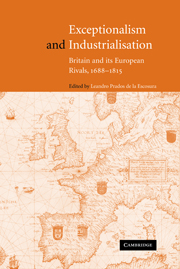Book contents
- Frontmatter
- Contents
- List of tables and figures
- List of contributors
- Acknowledgements
- Introduction: Was British industrialisation exceptional?
- Part I The origins of British primacy
- Part II Agriculture and industrialisation
- Part III Technological change
- 5 The European origins of British technological predominance
- 6 Invention in the Industrial Revolution: the case of cotton
- 7 Continental responses to British innovations in the iron industry during the eighteenth and early nineteenth centuries
- Part IV Institutions and growth
- Part V War and Hegemony
- Conclusions
- References
- Index
7 - Continental responses to British innovations in the iron industry during the eighteenth and early nineteenth centuries
Published online by Cambridge University Press: 04 December 2009
- Frontmatter
- Contents
- List of tables and figures
- List of contributors
- Acknowledgements
- Introduction: Was British industrialisation exceptional?
- Part I The origins of British primacy
- Part II Agriculture and industrialisation
- Part III Technological change
- 5 The European origins of British technological predominance
- 6 Invention in the Industrial Revolution: the case of cotton
- 7 Continental responses to British innovations in the iron industry during the eighteenth and early nineteenth centuries
- Part IV Institutions and growth
- Part V War and Hegemony
- Conclusions
- References
- Index
Summary
Introduction
Apart from the question of whether spectacular inventions were more important than continuous improvements for the Industrial Revolution, it seems pretty clear that an integral part of that path-breaking event in the history of mankind was the transition from techniques using vegetable fuel (wood or charcoal made from wood) to techniques using mineral fuel (coal). For this transition the primary iron industry can serve as a foremost example; also, in the long run, innovations in this sector were highly important.
In the following, I want to give a summary account of this transition process in Great Britain and its transfer to some continental countries during the second half of the eighteenth century and the first decades of the nineteenth century. The period is thus mainly confined to the time before the crucial demand of railway construction made the iron industries in most continental countries completely switch to the economically successful British model. Both for Britain and most countries on the continent following later, the transition from an organic/wood economy towards a mineral-fuel/coal economy (Wrigley, 1988) raises the question of ‘Why the delay?’ (Landes, 1969: 126). Landes asked this question when comparing the continental achievements in industrial performance with those of Britain around the Crystal Palace World Exhibition in 1851. At bottom, the question can even be turned against Britain, though.
- Type
- Chapter
- Information
- Exceptionalism and IndustrialisationBritain and its European Rivals, 1688–1815, pp. 145 - 170Publisher: Cambridge University PressPrint publication year: 2004
- 2
- Cited by



